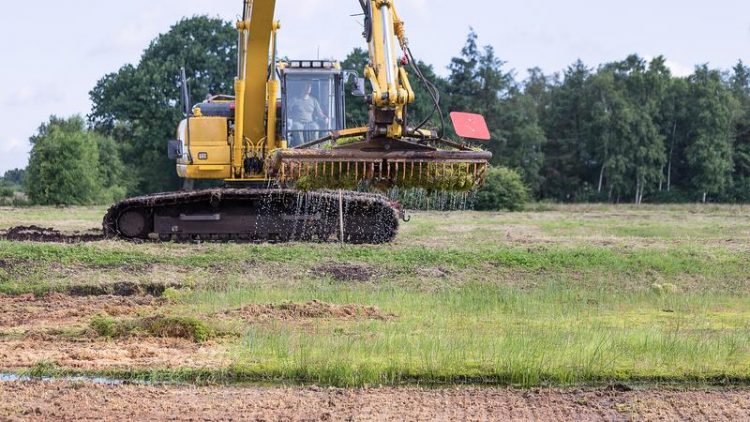Conference Week RRR2017 on Renewable Resources from Wet and Rewetted Peatlands

The world’s first mechanical Sphagnum harvest at Hankhauser bog Photo: Philipp Schröder
Wet peatlands protect the world’s climate as gigantic carbon sinks. Drained peatlands, in contrast, globally emit over 2 Gt of carbon dioxide per year. To reverse this dramatic climate damage, peatlands must be rewetted and can often still be cultivated.
Paludiculture – the utilization of wet peatlands – can get things started and deliver renewable energy resources and biomass for building materials or fodder while substituting fossil resources.
Apart from this, wet peatlands offer ecosystem services such as nutrient removal, water retention and habitat provision. Almost 200 scientists, land owners, land users and environmentalists have come together at the RRR2017 to promote this promising and necessary concept.
Prof. Dr. Johanna Eleonore Weber, rector of the University of Greifswald, proudly pinpointed the origin of the term ‘paludiculture’ and the 200 years of peatland science in Greifswald.
In her opening speech, she stressed that within the last 20 years, there have been more than 20 projects on peatlands and paludiculture at the University of Greifswald, since 2017 also as part of the State’s research excellence initiative. The Greifswald born concept of a sustainable use of wet peatlands has meanwhile gained international reputation and ac-ceptance.
More Information
http://www.rrr2017.com
http://www.paludikultur.de
The photos can be downloaded and used for free for editorial purposes in combination with this media release. You must name the image author. Download: https://www.uni-greifswald.de/universitaet/information/aktuelles/medienfotos/med…
Contacts at the University of Greifswald
Dr. Franziska Tanneberger & Greta Gaudig
Greifswald Mire Centre
c/o Michael Succow Stiftung
Ellernholzstraße 1/3
17489 Greifswald
Tel.: +49 3834 8354220
Fax: +49 3834 8354222
franziska.tanneberger@greifswaldmoor.de
Media Contact
All latest news from the category: Event News
Newest articles

NASA: Mystery of life’s handedness deepens
The mystery of why life uses molecules with specific orientations has deepened with a NASA-funded discovery that RNA — a key molecule thought to have potentially held the instructions for…

What are the effects of historic lithium mining on water quality?
Study reveals low levels of common contaminants but high levels of other elements in waters associated with an abandoned lithium mine. Lithium ore and mining waste from a historic lithium…

Quantum-inspired design boosts efficiency of heat-to-electricity conversion
Rice engineers take unconventional route to improving thermophotovoltaic systems. Researchers at Rice University have found a new way to improve a key element of thermophotovoltaic (TPV) systems, which convert heat…



